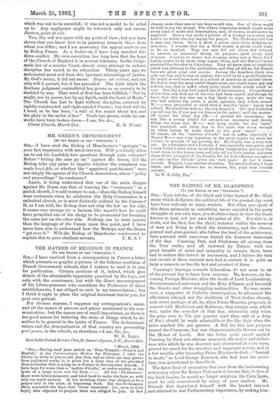"March, 1882.
"SIR,—Having read your article on 'Free Thought—French and English,' in the Contemporary Review for February, I take the liberty to write to you to tell you that, bad as what one may gather from published works is, it gives but a faint idea of the practical demoralisation that is going on in France in Government schools. I have been for some time a maitre d'aude,' or under-master, at the lycde of a large town not far from —. All the ' Professenrs ' there were Libres-penseurs, and tried herd to make the boys so, with -only too much success. In the morning, there was obliged to be a prayer said in the class, at beginning work. But the Professeurs often reminded the boys that those messieurs' [sic, even to little boys] who objected to prayers were not obliged to join. In few classes, more than one or two boys would rise. One of these would be told to say the prayer. The others, remaining seated, would make every kind of noise and interruption, and, of course, would never be reproved. Once a boy made a picture of a donkey on a cross, and held it up before the boy saying the prayer. The Professor told him it was very clever. Once a week a priest gave them religious in- struction. I wonder that for a little money a priest could come to be so insulted. They not only did not listen, but refused to answer, or answered wrong on purpose ; gave every kind of insult. I had to be there; but keeping order was a farce, furl had no power to do more than report them, and the Director never punished for disorder in Catechism. They all knew that to insult the priest was pleasing to the authorities, and they all did so, for French boys are great prigs and sneaks. Among the boarders there was only one boy, and be was an orphan, who tried to be a good Christian. He might as well have been in a school of heathens in ancient times. He had to hear the most awful blasphemies, and could never get any redress, nay, had to suffer every petty insult little minds could in- vent. One day a boy had copied one of his exercises. The professor of the class saw that one of the two had been copied, and though he knew that this boy was not a boy likely to copy, while the boy who had written the other, a great, ignorant, lazy fellow, named M—, was, pretended to think that it was the 'saint' (as he was called). He taxed him with it; the boy denied it. 'Oh! you Catholics can tell any lie, if you pay ten francs to the priest,' said the master. Of course the other boy (AI—) avowed his innocence; no boy like a young infidel for ont-and-out meanness and deceit. Every one knew that M— was lying really, but the saint' was punished, and every boy in the class was mean enough
to curry favour by some insult to the poor 'saint.'
Of course, all the maitres d'etude ' had to suffer, especially I Master M— was very ingenious in the petty insults he made me endure, on account of my poverty, he. His family was a very rich one. As a foreigner and a Catholic, I was especially unpopular, and I soon found I must listen to all his filthy blasphemies, and hear him teach them to tho young ones, and take all his little insults, and even those of the youngest of his friends, for he had influence enough to get any maitre d'etude' given his 'hnit jours.' At last it came to that. Happily, I got another situation. Excuse the liberty I have taken, and please believe me to remain, Sir, your very humble servant,
To W. S. Lilly, Esq."


































 Previous page
Previous page